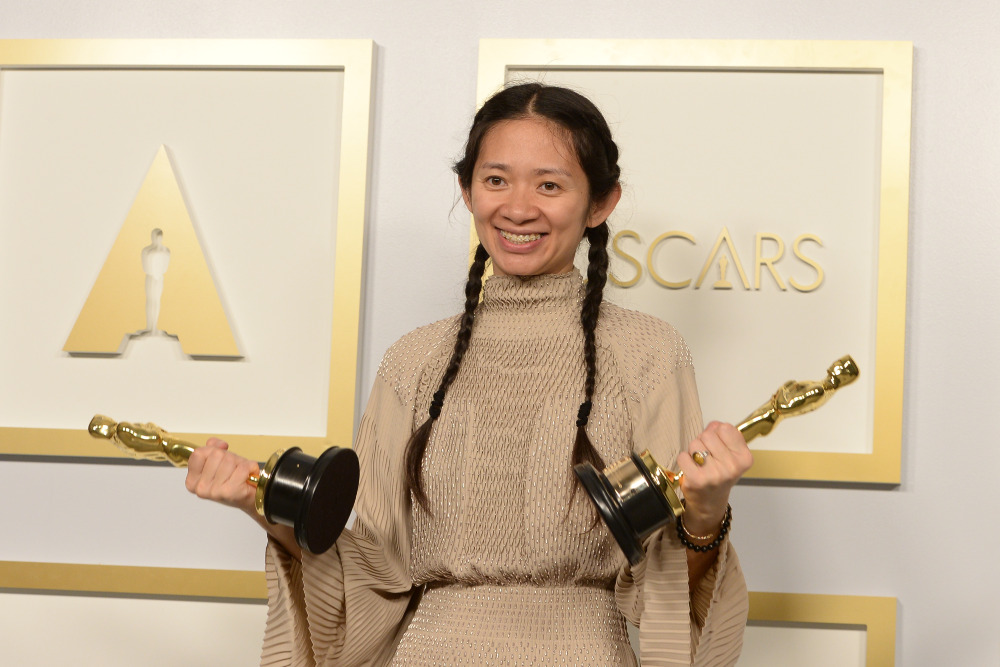Chloé Zhao Makes History as the Second Woman to Win the Best Director Award

In the Oscars’ ninety-three years of run time, Chloé Zhao has just made history with her historic win of the Best Director Award. Her film Nomadland also snatched this year’s title for Best Motion Picture that same night. This young filmmaker was nominated for a total of four awards in one night, the first time a woman has ever received such an honor. This night posed to be monumental in two ways: Zaho became not only the second woman to ever win in this category, but the second person of color coming behind Bong Joon-Ho from the 2019 Oscars for his film Parasite.
This awards show, along with many others, have been singled out for their serious inclusion problem. This was seen earlier this year at the Grammy’s where people of color such as The Weeknd, Rina Sawayama, and BTS were either not nominated or whose category was not premiered on the live show. However, the Oscars turned some of these rumors around with Chloé’s magnificent win.
After the 2019 Oscars, there was a period of self-congratulation for the program. Yes, the awards were becoming more inclusive, especially since that year’s Best Motion Picture went to a foreign feature film. However, it does not take away from the fact that over the Oscars ninety-plus-year history, this had never happened before. Only a couple of years ago non-English speaking films finally made it out of their designated category and onto the nominations roster for Best Motion Picture.
The last female winner for Best Director was Kathryn Bigelow in 2010 for her film The Hurt Locker. Taylor Hackford, the Director’s Guild of America’s president, spoke at the time about her achievement saying, “Clearly there is much more to be done to encourage diversity in film-making. But there is also much to celebrate.” Yet eleven years later this barrier was able to be broken through again, and this time from a person of color.
At the time of Bong Joon-Ho’s success, women directors were shut out of the Oscars despite many wonderful female-directed films that year: Greta Gerwig’s Little Women, Céline Sciamma’s Portrait of a Lady on Fire, and Alma Har’el’s Honey Boy. Greta Gerwig’s debut film Lady Bird was in fact nominated for Best Director in 2017, becoming the fifth woman to ever be nominated in that category.
What Does Chloé Zhao’s Future Hold?
As of right now, it is hard to tell whether or not Zhao’s win will create a rupture in the media sphere to reshape how they’ve been selecting nominations all these years. Gravitation towards male and mostly white candidates for the Oscars, and in many other media outlets, have been prominent for such a long time that it will take decades to overcome. But let’s not overtook this victory for the women and people of color in this country who have felt underrepresented when it came to being awarded for their films and music.
Zaho’s creation, Nomadland, was a milestone in her career being able to express what she has wanted to after her previous experiences with the film The Rider. The experience was a meticulous process, where Zaho spent a lot of time observing the characters and getting a feel for who they are and how they act. She said “It’s the magic of film-making, right? You hear a lot of stories, you pick the one that is going to work for the story, put it on a page, just like any script,” to ABC Arts on the film-making during Nomadland.
In addition to Zhao’s win for Best Director, actress Yuh-Jung Youn was awarded for her performance in the film Minari. Although this year has been highly representative of Asian films and Asian filmmakers, the world that takes place outside of the Oscars is a different ball game. The country is still in dire need to confront its growing anti-Asian sentiment that rose exponentially after the Covid-19 virus. Many factors contributed to the immense blame this minority faced during the pandemic, including the effects of the Chinese Exclusion Act, to Trump’s statements calling the virus “Kung Flu,” and all the history in between.
Zaho has managed to continue making breakthroughs in the filming industry. She was chosen as one of the directors for Marvel’s upcoming film The Eternals. as the first person they’ve collaborated with to have ever received the Best Director Award. She was also given a cast of very well-known, talented actors such as Angelina Jolie, Kumail Nanjiana, Salma Hayek, and Brian Tyree Henry, just to name a few. In fact, the filming for The Eternals ended right before the pandemic in February of last year, even though it will be released in November 2021.
China Censors Chloé Zhao and “Nomadland”
Yet, despite her success and quick rise to both prestige and popularity among America’s great filmmakers, this Beijing-born director has been met with a lot of anger and controversy from China. As Zhao received her award at the Oscars, she talked about her childhood in Beijing and recited a line from the Three Character Classic poem which translates to, “people at birth are inherently good.” Initially, the Chinese media praised Zhao after she won Best Director at the Golden Globes last month, calling her “the pride of China.” Things quickly went downhill as the Filmmakers Magazine interview with the director from 2013 resurfaced.
Zhao discussed how she felt, “you were never going to be able to get out,” because, she felt, China is, “a place where there are lies everywhere.” The full interview now omits a lot of what Zhao said about her experiences in China since its initial publication. Nevertheless, the Chinese public was outraged and many reports of censorship began spreading around.
Major media outlets like CCTV and Xinhua decided not to mention anything about Zhao’s win, but the hashtag “Chloe Zhao wins Best Director” still became trending on the popular Chinese social media application, Weibo. However, there have been high reports about many influencer’s posts being censored. Guda Baihua, a Weibo user with a following of thirteen million, posted a video of Zhao’s speech at the Oscars. Still, the video was taken down for it, “did not pass Weibo reviews.”
Despite Zhao’s comments on early life in China, she still credits her childhood for much of her success. This environment motivated something within young Zaho to look beyond Chinese horizons and move to the U.K. before high school began. Studying political science at a liberal arts college helped her relearn her history and, “figure out what is real,” she later said in the same Filmmakers Magazine interview.
She’s talked about her roots and on viewing the Northern Chinese people as her own. Yet, she’s explained the feeling of being an outsider in the film-making industry. Zhao’s experience of “never fitting in” allowed her to take a step back and focus on the lives of those who survive on the borders of society, which is what Nomadland is all about.

Columnist | K-pop Stan | Tweet me @senaho5




